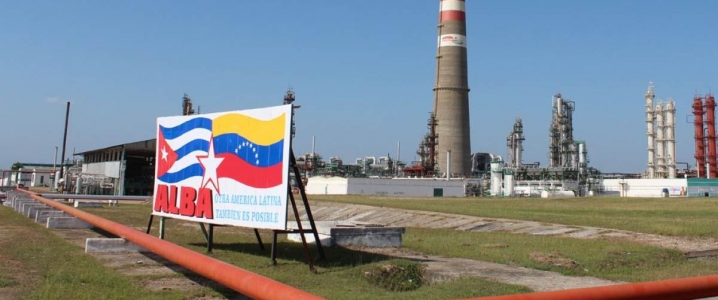www.aljazeerah.info
Opinion Editorials, August 2018
Archives
Mission & Name
Conflict Terminology
Editorials
Gaza Holocaust
Gulf War
Isdood
Islam
News
News Photos
Opinion Editorials
US Foreign Policy (Dr. El-Najjar's Articles)
www.aljazeerah.info
As US Sanctions On Iran Spark Increases in Oil Prices, No More Plans to Sanction Venezuela's Oil By Tsvetana Paraskova and Irina Slay Oil Price, Al-Jazeerah, CCUN, August 9, 2018 |
|
 |
|
Oil Prices Inch Higher As Sanctions On Iran Kick In
By Irina Slay
Brent crude and West Texas Intermediate both started the day today with only moderate gains despite the return of U.S. sanctions against Iran that will take effect at 12:01 a.m. Eastern Time today (August 7, 2018).
At the time of writing, Brent crude was trading at US$73.81 a barrel, with WTI at US$69.05, both up by less than a percentage point from yesterday’s close. But this could change later in the day as the flow of forecasts of reduced supply intensifies.
French Societe Generale has already estimated that the sanctions will remove 1 million bpd of Iranian oil from global markets, and yesterday a Goldman Sachs analyst told Bloomberg that the bank expected a “very, very tight oil market”.
Monday saw the return of sanctions against Iran’s metals, aerospace, and automaking industries. President Hassah Rouhani said President Trump’s recent suggestion the two could meet was only for show, CNBC reported. Indeed, any talks are unlikely since Washington has made it clear it will take nothing short of a regime change to remove the sanctions.
The alternative—Iran’s government agreeing to all U.S. demands such as putting an end to its participation in regional affairs, support for the Yemen Houthis, Hamas, and Hezbollah, and “meddling” in Syria—remains within the realm of fantasy. Related: Warship Or Oil Tanker – What Did The Houthis Hit?
Iranian oil importers from China to Europe are not too happy with the U.S. course of action, but Washington has once again reiterated its intention to see Iranian oil exports squeezed out completely by November 4. A government official this week repeated this goal, adding that the case-by-case treatment of countries was still on the table, but that “but our goal is to reduce the amount of revenue and hard currency going into Iran.”
By the looks of it, oil prices are set for a rise in the coming months as the effect of the sanctions begins to be felt, which is not particularly good news for the administration: midterm elections are coming in November and prices at the pump tend to have an impact on voting decisions. Yet for now it seems the crackdown on Iran is higher on Washington’s priority list than keeping gas prices lower for longer.
***
Why The U.S. Won’t Sanction Venezuela’s Oil
By Tsvetana Paraskova
Over the past year, the U.S. has imposed increasingly restrictive sanctions on Venezuela’s finances and debt issuance as Nicolas Maduro continues to tighten his grip over the collapsing Venezuelan state.
Yet, despite expectations that the U.S. would slap direct sanctions on Venezuela’s oil industry, Washington appears reluctant to go any further.
The word out of Washington is that the United States is no longer looking at sanctioning Venezuela’s oil industry, and not just because Venezuelan oil accounts for a large part of the imports of the refiners on the Gulf Coast. The U.S. Administration doesn’t want to be responsible for the total collapse of Venezuela, and doesn’t want to be blamed for contributing to it, analysts told Platts’s Brian Scheid.
“If you break it, you buy it,” George David Banks, a former international energy and environment adviser to U.S. President Donald Trump, told Platts. “The White House doesn’t want to own this crisis.”
It looks like the U.S. Administration is currently shelving the idea of imposing oil sanctions on Venezuela, and the Trump Administration is much more hesitant than last year, probably more hesitant than ever, to use what has been seen as the ultimate punishment on Venezuela—a ban on U.S. imports of Venezuelan oil and/or a ban on U.S. exports of diluents that help Venezuela to blend its heavy crude oil so it can pass through pipes for export.
Rumors of U.S. sanctions on Venezuelan oil have been circulating the news flow for more than a year. This time last year, such sanctions were more in the realm of ‘when’ rather than ‘if’.
The United States, however, while continuously tightening financial sanctions and designating a growing number of officials and persons, has so far refrained from slapping Venezuelan oil with restrictions. Related: Canada Frees Itself From Saudi Oil Imports
One reason may be that Gulf Coast refiners continue to rely on imports of Venezuela’s heavy oil. Despite the collapsing oil production, Venezuela has seen exports of crude oil to its biggest market, the United States, climb since February this year. In fact, between February and June, Venezuelan oil exports to the Gulf Coast refineries increased by an impressive 43 percent.
While U.S. imports in February stood at 472,000 bpd, they increased to 559,000 bpd in March, and to 632,000 bpd in April, EIA data shows. According to preliminary U.S. Customs data reported by Platts, oil imports from Venezuela averaged around 530,300 bpd in July.
Venezuela’s exports to the United States are holding steady, but its total oil production is collapsing, to the tune of around 50,000 bpd each month, even without direct sanctions on its oil.
Outside of war-induced outages, Venezuela is suffering the worst loss of oil production in history amid an unprecedented economic collapse, years of mismanagement and underinvestment in the oil industry, an aggravating humanitarian crisis, and a leader who is hell-bent on clinging to power. Venezuela’s inflation will surge to one million percent by the end of this year as the country with the world’s biggest oil reserves remains stuck in a profound economic and social crisis, the International Monetary Fund (IMF) predicts.
The rig count in Venezuela plunged to 28 rigs in July 2018, compared to 50 rigs in July 2017, according to the Baker Hughes International Rig Count. Related: China’s Oil Futures Jump To Record High
OPEC’s latest Monthly Oil Market Report showed that Venezuela’s oil production dropped by 47,500 bpd from May to average 1.340 million bpd in June. This compares with an average of 2.154 million bpd in 2016, and an average of 1.911 million bpd in 2017.
The EIA joins other forecasts in predicting that Venezuela’s production will drop to below 1 million bpd by the end of this year, and to just 700,000 bpd by the end of next year. The 700,000 bpd projection is comparable to the current oil production of New Mexico, for example.
In view of this utterly desperate situation in Venezuela’s oil industry, U.S. sanctions would only make things worse and lead to higher oil prices, which President Trump and the Administration don’t want ahead of the mid-term elections in November.
Then, Maduro could use U.S. oil sanctions to blame the ‘imperialist power’ for the total collapse of the country. The United States wants to avoid taking responsibility for this collapse at all costs.
***
Share the link of this article with your facebook friends
|
|
|
|
||
|
||||||




